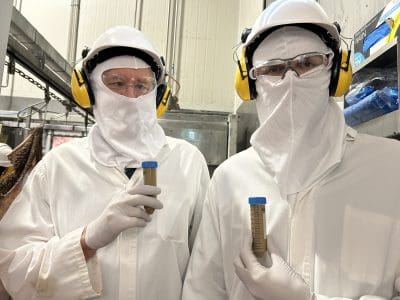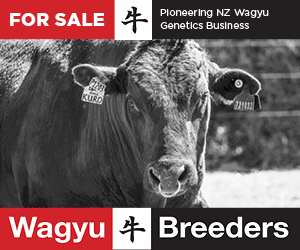QUEENSLAND processor and integrated beef supply chain Australian Country Choice is assisting new Australian research aimed at reducing greenhouse gas emissions from cattle.
Scientists from Australian agbio-start-up Bovotica, are collecting rumen samples from cattle being processed at ACC’s Cannon Hill facility.

Bovotica’s Drs James Volmer and Stuart Denman collecting rumen samples at the ACC plant.
The samples are driving research into changing the biology inside the animal’s gut – aimed at reducing methane emissions from cattle by up to 80 percent. The novel technology developed by the Brisbane-based business also delivers production efficiency improvement of up to a 10pc, early research has shown.
For the technically-minded, Bovotica’s product is a mix of endogenous hydrogenotrophic rumen bacteria that reduce methane by sequestering hydrogen away from methanogenesis. They then use the hydrogen as an energy source to produce short-chain fatty acids, which drive additional weightgain in the animal.
Most of the bacteria strains have never been isolated before, and a few are completely novel, Bovotica says.
The company is a spinout from the Queensland University of Technology, and its methane inhibiting product was runner-up in the university’s pitching competition held last December. More recently, it was a finalist at the Pitch in the Paddock competition at Beef2024 in Rockhampton.
Co-founder and chief executive Dr Andrew Leech said the company was precisely modulating the microbiome of the rumen, by using a proprietary probiotic/prebiotic feed supplement.
 “We are delivering a reduction in methane emissions while simultaneously increasing production efficiency,” he said. “For beef and dairy producers it means more milk or meat per unit of feed intake.”
“We are delivering a reduction in methane emissions while simultaneously increasing production efficiency,” he said. “For beef and dairy producers it means more milk or meat per unit of feed intake.”
“The probiotics are mainly hydrogenotrophic bacteria that naturally occur in the rumen microbiome. Our approach is simply to increase their number so they can outcompete the methanogenic archaea for hydrogen. Hydrogen is the most important energy source in the rumen, and the methanogenic archaea combine it with carbon dioxide to make methane,” Dr Leech said.
“Our technology improves the ratio of the hydrogenotrophs to the methanogens, which reduces the pool of hydrogen available for methanogenesis, and methane production goes down.”
Bovotica’s probiotics also have a second function, using the sequestered hydrogen to produce short chain fatty acids, the best energy source to drive weightgain in cattle.
“Consequently, our technology improves feed efficiency by reducing the amount of energy being wasted by methane production and directing this energy into a production efficiency,” Dr Leech said.

Paul Gibson
“Working alongside ACC, we are working towards a sustainable, climate-friendly and prosperous livestock sector for Australia.”
Australian Country Choice’s R&D manager Paul Gibson said ACC was proud to support this world-leading research conducted by an Australian company working towards a more sustainable Australian beef supply chain.
Beef Central will report back with more details, as the research work unfolds.
